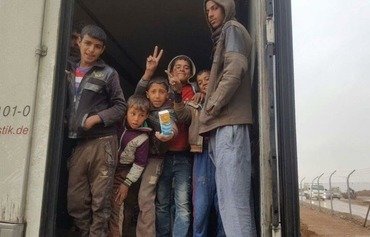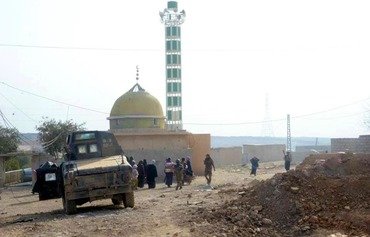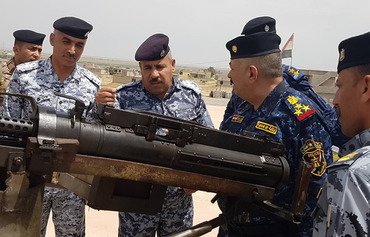Residents of western Mosul, which is still under "Islamic State of Iraq and the Levant" (ISIL) control, are on the brink of a famine, Iraqi officials and city residents tell Diyaruna.
As she fed her children from a large platter of rice at a displacement camp south of the city, newly displaced west Mosul resident Salma Ahmed said she and her children had not eaten a single full meal in a week.
Inside the city, she told Diyaruna, the family had been forced to survive on flour that was not fit for consumption, which she used to bake in a small dish with some vegetables when they were available.
Due to the scarcity of food and drink, she and her husband ate very little, she said, giving part of their share to the children so they could eat.
Western Mosul is facing "a real famine" under ISIL, Ninawa provincial council member Hassan al-Sabawi told Diyaruna.
"You may not believe the enormity of the famine that hangs over [west Mosul]," he said. "Look only at the faces of those of the populace who are fleeing ISIL. You will see the signs of hunger visible on them."
Western Mosul was facing economic hardship even before ISIL overran the city, he said, which has been exacerbated by ISIL's rule and the siege imposed on the city as a result of military operations.
The economic situation has deteriorated precipitously, he added, and has now reached the stage of famine.
UN appeals for more aid
UN chief Antonio Guterres on Friday (March 31st) appealed for more aid for the people of Mosul, AFP reported.
More than 200,000 civilians have fled west Mosul since mid-February, while the fighting has taken a devastating toll among the hundreds of thousands more still trapped in the battleground.
The UN said earlier in March that some 600,000 civilians were still in west Mosul, 400,000 of them trapped in siege-like conditions in the Old City.
Remaining in the city has posed a danger to residents, with the UN human rights office saying more than 300 civilians were killed in west Mosul in little over a month.
"We do not have the resources that are necessary to support these people and we do not have the international solidarity that is needed," Guterres said during a visit to the Hasan Sham Camp.
"Unfortunately, our programme here is only funded at 8%. That shows how limited our resources are," he said.
"These people have suffered enormously, and they go on suffering. We need more solidarity from the international community."
Guterres said there were not enough resources available to provide acceptable living conditions for the people of Mosul or for the reconciliation efforts that will need to follow when the city has been fully recaptured.
Insufficient preparations
Ninawa council member al-Sabawi criticized the Iraqi government's lack of preparedness to handle the anticipated wave of displacement from Mosul.
Although the operation to liberate the city began nearly six months ago, "the Ministry of Migration and Displacement has not adequately prepared to face the challenge", he told Diyaruna.
"A displaced person only needs a small tent, food and a heater," he said. "Despite this, government ministries failed to secure these basic necessities for the increasing number of internally displaced persons (IDPs)."
Ninawa provincial council member Hiyam Abdal called on the Ministry of Trade to make ration card items available as soon as possible and to provide the province's population with food items to ward off the looming famine.
The distribution of food items will help residents of eastern Mosul meet the challenges they face, she said, as in addition to facing shortages themselves, many are hosting friends or family fleeing from western Mosul.
Iraqi MP Intissar al-Jubury, who serves on the parliamentary women’s committee, called on Iraqi Prime Minister Haider al-Abbadi to accelerate the liberation of western Mosul to save the people from possible famine.
"The continuation of the situation as it is may cause a real humanitarian disaster, which calls for concerted efforts to save the citizens there as soon as possible," she told Diyaruna.
Food stocks have begun to run out, she said, and the severe shortage of food, milk and drinking water has resulted in a tragic situation.

![Displaced residents of western Mosul queue for food at a displacement camp outside the city. [Photo courtesy of the Iraqi Ministry of Migration and Displacement]](/cnmi_di/images/2017/04/04/7555-Iraq-food-queue-600_384.jpg)






